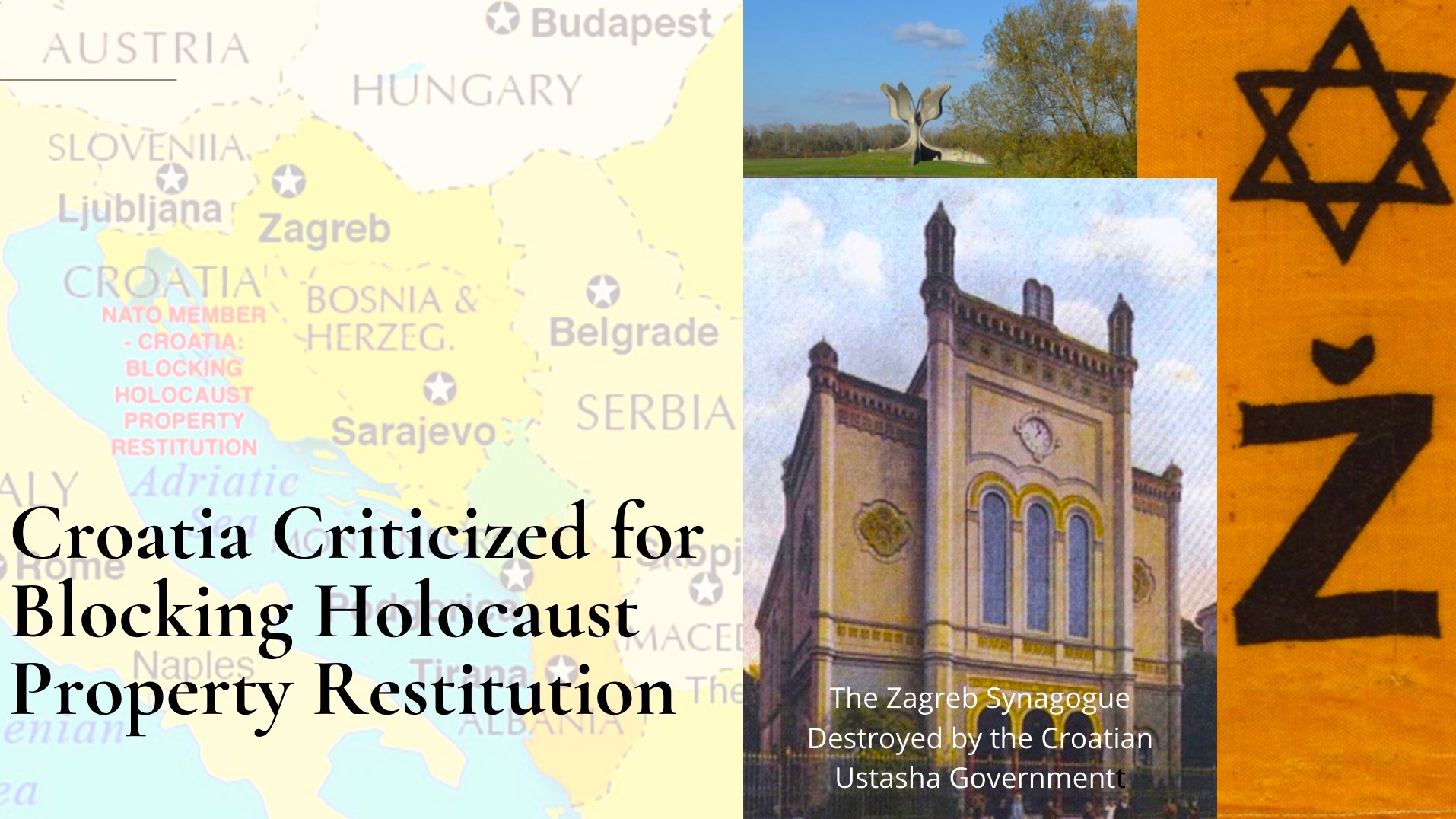CROATIA CRITICIZED FOR BLOCKING HOLOCAUST PROPERTY RESTITUTION

By: International Leaders Summit
Photo: ILS
Croatia, a NATO member in the Balkans was taken to task for blocking the return of Jewish property through a public statement issued by two American Senators and a recent U.S. State Department report. In contrast, Serbia was publicly praised for Holocaust property restitution by the U.S. government through its official statements and the U.S. Embassy in Belgrade’s website.
The U.S. State Department’s Justice for Uncompensated Survivors Today (JUST) Act Report on Croatia released on July 29, 2020, stated the following:
“Croatia does not have adequate legal mechanisms to address Holocaust-era property restitution, and the government generally has not demonstrated the political will to return property taken from Jews during the Holocaust and after WWII. The U.S. government has long advocated with the Croatian government for restitution of Jewish individual and communal property, and for Croatia to develop a mechanism to address issues related to Jewish property rendered heirless as a result of the Holocaust.”
According to published reports, “…the Jewish Community of Zagreb estimated that Croatia’s government had returned no more than 2 percent of the value of Jewish communal and private property seized during the Holocaust.”
US Senators Marco Rubio (R-FL) and Tammy Baldwin (D-WI) released the following statement on July 29, 2020:
“Political resistance in many countries has impeded the implementation of restitution legislation or otherwise hindered the resolution of Jewish communal property claims, including in: Poland, Latvia and Croatia.”
US Senators Rubio and Baldwin further communicated concerns about NATO allies, which failed to address the restitution of Jewish communal, private and heirless property. The joint statement further stated:
“In 2016, Serbia became the first, and thus far the only, country to enact legislation on heirless and unclaimed property following the 2009 Terezin Declaration while others had earlier adopted legislation. Nations which have yet to adopt heirless property legislation include Belarus, Bosnia Herzegovina, Bulgaria, Croatia, the Czech Republic, Estonia, Latvia, Lithuania, Luxembourg, Moldova, Montenegro, Poland, Russia, Slovenia and Ukraine.”
For too long, NATO member states such as Croatia have thwarted America’s principled efforts to insist on Holocaust property restitution. U.S. leaders and enagaged advocacy groups have clearly relayed to Croatia’s government to uphold the rule of law and property rights and to strike down the Balkan nation’s anti-Semitic laws. This key element was part of the NATO accession process which insisted on the return of private property to Jewish families and the community at large.
The U.S. State Department’s “Property Restitution in Central and Eastern Europe” piece states the following:
“The United States has strongly supported efforts to restitute to rightful owners property confiscated by the Nazis 1933–45 and by the subsequent communist governments of Central and Eastern Europe. Positive action on property issues was one of the criteria used to judge the progress of countries that aspired to North Atlantic Treaty Organization (NATO) membership. The European Union (EU) also recognizes the relevance of property issues in applicant countries. A successful property restitution program is an indicator of the effectiveness of the rule of law in a democratic country. Non-discriminatory, effective property laws are also of crucial importance to a healthy market economy.”
Croatia which has reneged on the pledge to restitute Holocaust property to Jewish families, has continued to pay compensation and retirement assistance to the pro-Nazi Ustasha government soldiers and policemen.
In an earlier piece, International Leaders Summit shared these findings:
Commencing in 1941, the Ustasha regime headed by Ante Pavelic, rounded up Jews, Roma, Serbs and other non-Catholic minorities, sending them to the Jasenovac concentration camp (one of the largest concentration camps in Europe), Sisak children’s concentration camp, and other locations. The Jasenovac concentration camp was referred to as “the Auschwitz of the Balkans”.
According to the Jerusalem-based Yad Vashem, “The concentration of Jews in camps began in June 1941. By the end of that year about two thirds of Croatia’s Jews had been sent to Ustaša camps, where most of them were killed on arrival. In August 1942 and May 1943 the Germans deported the remaining Jews from Croatia to Auschwitz. 30,000 out of Croatia’s 37,000 Jews perished in the Holocaust.”
Some 20,000 Jews of Croatia were murdered in the Jasenovac concentration camp alone, while the rest of the individuals were sent to their deaths in Auschwitz-Birkenau.
It is time for U.S. legislators to act upon their beliefs and principles and to hold to account Croatia’s belligerent and obstinate government.
Croatia’s government has received $500 million in World Bank without any accountability. The Balkan nation is known for its $35 billion in illicit financial outflows via crime, corruption and tax evasion during 2005–2014, amounting to 73% of the 2015 GDP. Western nation’s donor taxpayers ought to demand a detailed accounting of how World Bank funds are being used in Croatia.
Principled Action Steps to Hold Croatia’s Government to Account:
1. U.S. legislators and the administration should block the U.S. Visa Waiver program which Croatia’s government is eager to obtain.
2. Block all American taxpayer aid to Croatia via the World Bank, European bank of Reconstruction and Development, the U.S. State Department’s USAID and Department of Defense.
3. Implement the bilateral U.S.-Croatia extradition and mutual legal assistance instruments — the mutual legal assistance treaty (MLAT).




